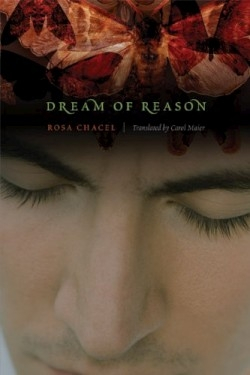Dream of Reason
Dream of Reason is the fictional diary of Santiago Hernández—written late into the night and secreted away—chronicling his childhood, first love, marriage, personal crises, and (from a distance) the Spanish Civil War and World War II. The novel, first published in Spain in 1960, is Rosa Chacel’s third to be published in English (Memoirs of Leticia Valle and The Maravillas District were also published by Nebraska) and is the latest in Nebraska’s European Women Writers Series. Her complex, somewhat reckless, intellectual, and allusive style (effortlessly rendered in English by award-winning translator Carol Maier) recalls Roberto Bolaño’s cult hit The Savage Detectives, except where Bolaño chases poetry, Chacel chases philosophy. Both authors depict their characters’ quests for utopia in an atmosphere of anxiety fueled by love, betrayal, unlikely enemies, and world-altering events beyond their control.
By telling Santiago’s story in his own words, Chacel ostensibly sets the novel in his mind. Santiago speaks directly to the reader, referring to his diaries as both his “confessions” and his “betrayal.” This intimacy allows the reader a close encounter with everyday events alongside his revelations, deepest longings, and at times, his dark, associative, and pathological thoughts. A diary is also rarely edited for length (Dream is 718 pages), which Chacel acknowledges in Santiago’s offhand remarks: he may “lack a talent for synthesis,” noting, “to cross out you have to pick up your pen again.”
The book’s focus is Santiago’s introspection and his contemplative conversations with the various characters who come in and out of his life: his first love Elfriede, his wife Quitina, and his fiercely intelligent aunt and nephew. However, Chacel does offer up narrative moments that glimpse Buenos Aires in the 1930s and ’40s: “several couples were taking a stroll, walking slowly, leaning against each other, as if to give darkness time to descend and time for the straight, solitary, naked street, with no doors or windows, sheltered by high, gray walls, to become a shadowy bedroom.”
One of Santiago’s chief philosophical conflicts is his notion that the power of his intention is strong enough to dictate events. When he imagines a fly’s death by contact with a light bulb, he looks up to see it happen. This fascinates him, but the crisis arises when his intentions—and their apparent outcomes—take on a sinister bent with far graver consequences. (October) Kara Mason
Disclosure: This article is not an endorsement, but a review. The publisher of this book provided free copies of the book to have their book reviewed by a professional reviewer. No fee was paid by the publisher for this review. Foreword Reviews only recommends books that we love. Foreword Magazine, Inc. is disclosing this in accordance with the Federal Trade Commission’s 16 CFR, Part 255.

